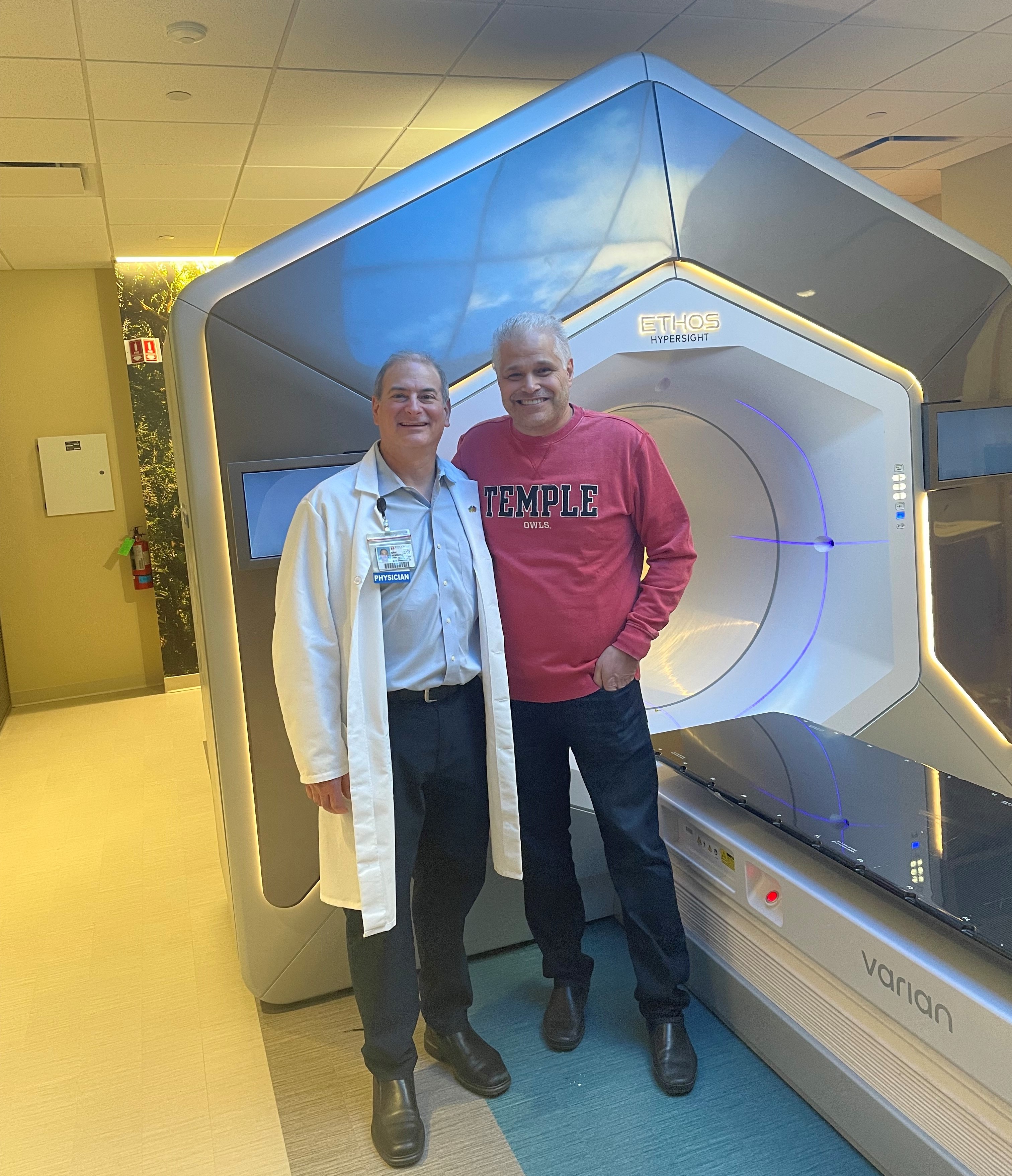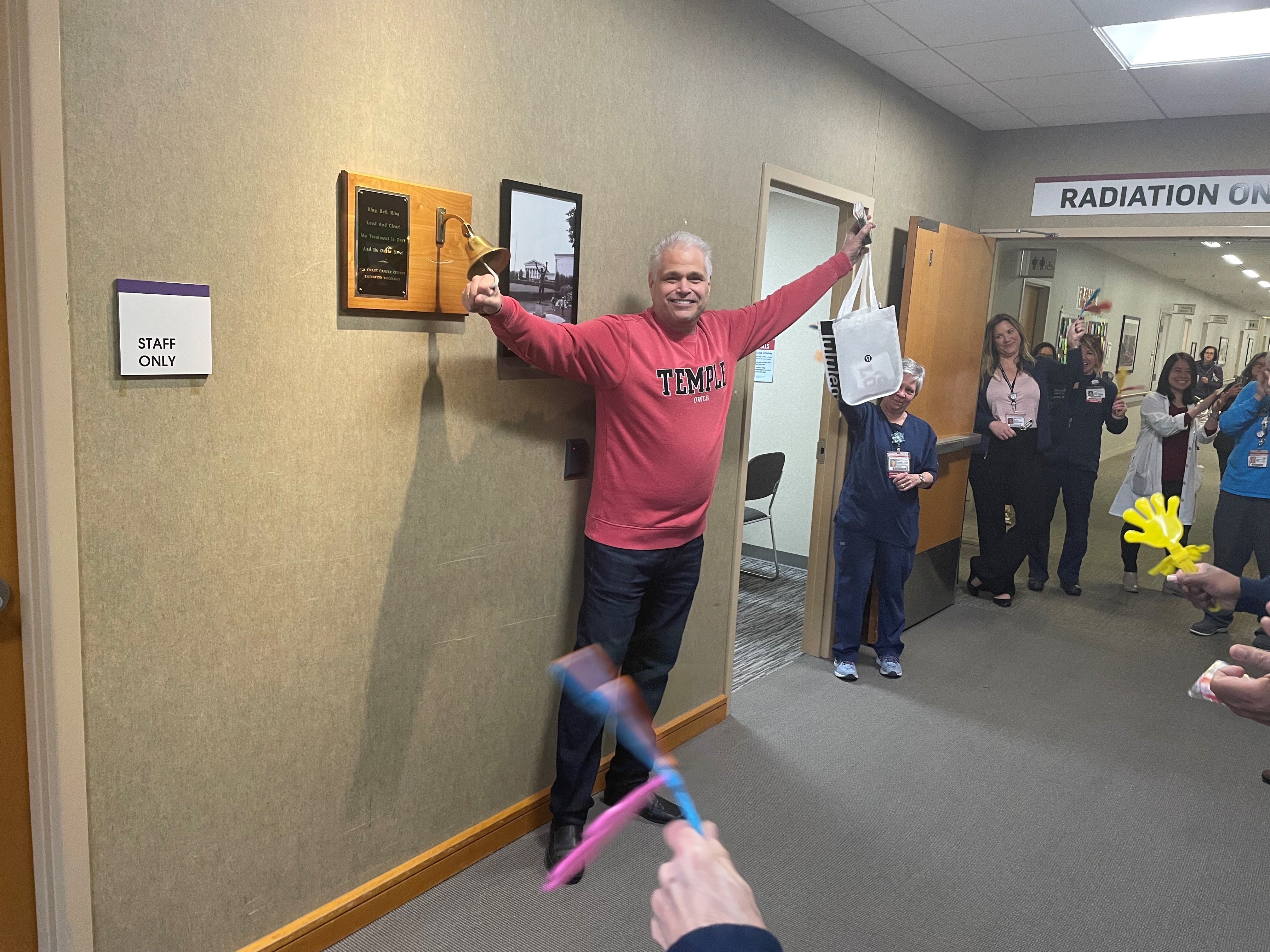“After our initial meeting, I instantly knew I was willing to spend seven weeks away from home to undergo adaptive radiation therapy delivered by Dr. Horwitz and his team at Fox Chase.”‐Valentino ‘Val’ Cardillo
My decades-long career working for companies involved in the healthcare industry took me all over the United States, from the Northeast, to the Midwest, to the South. Years later, so did my cancer treatment, eventually leading me at Fox Chase Cancer Center.
During an annual physical in my late 40s, my prostate specific antigen level, also known as PSA, came back higher than normal, and my physician sent me to see a urologist. The urologist performed a digital rectal exam and diagnosed me with prostate cancer in 2010.
Advocating for My Health
After the initial shock, I began to research the disease, its treatments, and the leading doctors to treat it. I wanted to be an advocate for my own healthcare.
Although I lived in Texas, I flew to Southern California to have a biopsy completed by a doctor using color Doppler ultrasound imaging, which was a relatively new technology at the time. Once the disease was confirmed, I traveled all over the country – Johns Hopkins, UCLA, MD Anderson, UT Southwestern – to talk with doctors about my treatment options.
I eventually decided on a surgeon at Northwestern in Chicago, where I underwent nerve-sparing open radical prostatectomy, removal of the prostate. Knowing some of the side effects associated with the surgery – incontinence and sexual dysfunction, among others – I wanted to feel confident and comfortable with my surgeon.
After the prostatectomy, I had my PSA monitored for more than a decade with no issues. It stayed undetectable until August 2023, when it increased slightly. With this increase, I reached out to my surgeon to determine next steps, which in my case was radiation. He suggested I seek a facility with the most up-to-date radiation equipment.
The Latest in Radiation
I started researching again. Based on that, I decided I wanted to find somewhere that could perform a PSMA PET scan, which had only recently been approved by the Food and Drug Administration. During this procedure, doctors inject a radioactive drug that attaches itself to any prostate cancer cells. Those cells light up on the PET scan, thus identifying the location of the cancer. A new PET/CT system called Quadra was only installed and ready for use in a few institutions at the time, including the Mayo Clinic in Rochester, Minnesota, where I decided to fly to have my scans.
My results showed the cancer recurrence seemed to be limited to the prostate bed. I was told the standard of care in this case is radiation to the prostate bed. During my research on the Quadra system, I connected with the medical director at the device’s manufacturing company. He told me I could potentially receive a relatively new form of radiation treatment – called adaptive radiation therapy – to my prostate bed using a technology from Varian Medical Systems called Ethos.
A Daily Radiation Plan

Typically, when undergoing radiation, your doctor develops a plan along with a physicist and radiation is delivered to the same area every day throughout treatment. With adaptive radiation therapy, the radiation oncologist and the physicist utilize the artificial intelligence software of the Ethos system to create a new treatment plan each day.
The daily plan takes into consideration certain variables, for example if organs such as the bladder or rectum have shifted day to day. This was very important to me, as I wanted to do everything possible to eliminate toxicity from unnecessary radiation to the surrounding organs. Ideally, this would help minimize future incontinence or diarrhea issues.
I wanted to know who the expert was in using adaptive radiation therapy. The suggestion was to go see Dr. Eric M. Horwitz, Chair of the Department of Radiation Oncology at Fox Chase Cancer Center and the Lewis Katz School of Medicine at Temple University. His experience with this approach goes back to the late 1990s, when he was a resident in radiation oncology and co-author on one of the earliest published studies on it.
Flying to Philadelphia
I flew to Philadelphia to meet Dr. Horwitz. From my prior experience in finding a surgeon, I knew a personality match with my radiation oncologist would be important. For me, having trust and confidence in your doctor is more than half the battle in approaching your treatment with a positive mindset. After our initial meeting, I instantly knew I was willing to spend seven weeks away from home to undergo adaptive radiation therapy delivered by Dr. Horwitz and his team at Fox Chase.
He worked with Jennifer Harren, Patient Coordinator for Lodging and Transportation at Fox Chase, to secure lodging one mile away at the AstraZeneca Hope Lodge, which is part of the American Cancer Society, for the duration of my treatment. Hope Lodge was an awesome experience and was very therapeutic for me. Only those diagnosed with cancer are allowed to stay at the facility. The daily interaction with the other patients, the Hope Lodge staff, and the numerous volunteers who provided dinner most nights was a humbling experience.
The First Case

My case was the first of recurrent prostate cancer that Dr. Horwitz used adaptive radiation therapy to treat. We learned a lot from each other. Each day, I went into Fox Chase for my treatment and saw Dr. Horwitz or another radiation oncologist from his team. It became such a pleasant routine that the day I rang the bell for my last treatment, I told my team – including Jarret, Ron, Amanda, and Mike – that I would miss it in a weird sort of way. The care they and their peers provided was exceptional.
We won’t know for sure how successful the treatment was for another couple of months. That is when an accurate PSA test can be conducted.
My entire experience with Fox Chase was positive. I consider the team there, and at Hope Lodge, to be a new part of my extended family.
Learn more about treatment for prostate cancer and adaptive radiation therapy at Fox Chase Cancer Center.